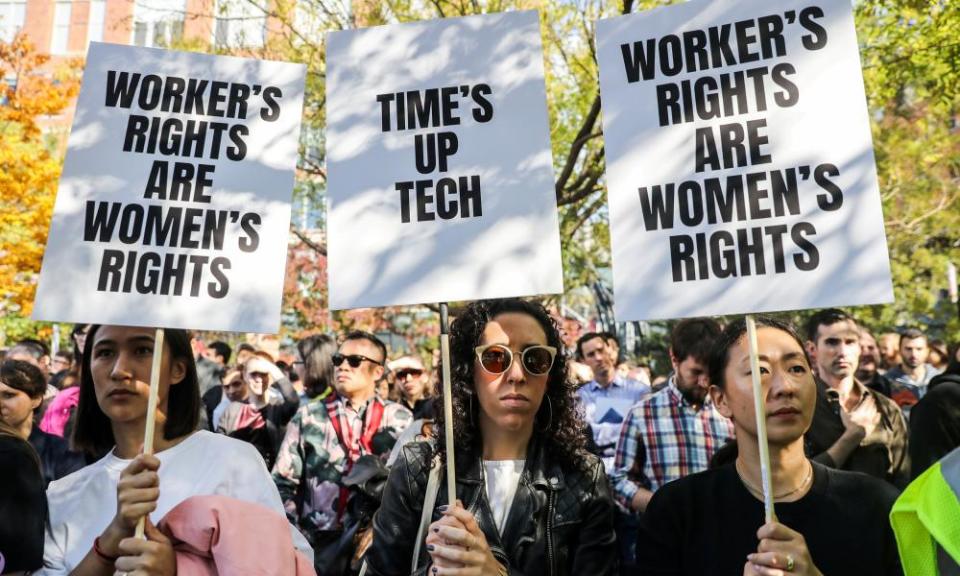After the Google walkout, is #Me Too about to get more militant?
Women’s stories of abuse have hardly made a mark on institutions like the tech giant. If talking alone doesn’t work, action will do

It started in Tokyo. On Thursday, Google employees around the world stopped work at 11am local time, as part of a planned protest against the tech giant’s handling of sexual harassment complaints. The protests happened in waves, with workers walking out of their offices, carrying signs and chanting, as the clock struck 11 in Singapore, Hyderabad, Berlin, Dublin, and finally in New York and at Google’s corporate headquarters in Mountain View, California.
The walkouts were the culmination of months of employee discontent over immoral choices by Google leadership, including a project called Dragonfly, a prototype of a censored search engine that could be deployed in China, where the state restricts its people’s access to information, and Project Maven, an artificial intelligence service developed for the US Department of Defense.
But the walkouts themselves were spurred on by a recent New York Times report that found that the company had tolerated alleged sexual harassment among its executives. Andy Rubin, one of the creators of Google’s Android mobile service, was given a $90m exit package and a fond farewell from Google leadership after an internal investigation found disturbing allegations of sexual harassment against him to be credible. The company also gave a multimillion-dollar exit package to another executive, and retained a third after allegations against him came to light. In all three cases, the company covered up the allegations, aided by the mandatory arbitration clauses in employee contracts that mandate that internal complaints against the company must be kept secret.
The revelation of the payouts to abusive executives is not the first time that Google has come under fire for its allegedly sexist internal culture. In 2017, the Google engineer James Damore ignited controversy by publishing a manifesto in which he claimed that women are less intelligent than men. Google has also faced lawsuits over its gender pay gap brought by former employees and the US Department of Labor. And in one embarrassing recent incident, Google founder Sergey Brin was asked at a staff meeting if he had any female role models. Brin responded that he had recently met a woman at a Google event who impressed him, but could not remember her name. The woman was Gloria Steinem.
There are dangers in overstating the significance of the Google walkout. The employees, after all, are among the more comfortable and powerful voices of the #MeToo movement; they are white-collar workers in major cities protesting against the actions of a powerful company that is subject to media scrutiny and thus more likely than others to be shamed into doing the right thing. In any social movement, there are pitfalls to overemphasising the voices of the powerful; it can begin to seem that theirs are the only voices there are.
But the Google walkout also demonstrates #MeToo’s versatility, and its potential to mobilise women around other, intersecting issues. The walkout organisers issued a list of demands that included a seat for an employee representative on the company’s board of directors, and greater protections for Google’s so-called gig-workers – the vendors, temps and independent contractors who are otherwise excluded from many labour protections.
Google employees who protested outside the New York office carried signs reading: “Workers’ rights are women’s rights.” In the revelations of Rubin and others being rewarded handsomely despite their abusive behaviour, Google employees have seen both a problem of male impunity for the harm that they do to women, and a problem of rich men’s impunity for the hurt they cause to the less powerful and wealthy. The protest focused with admirable clarity on the interdependency of gender and class inequities, and hints at the possibility of unionisation efforts among tech workers.
The move to stop work at Google also revealed another avenue for the #MeToo movement. During the year since the issue of pervasive sexual harassment and assault was brought into the limelight by revelations about the Hollywood producer Harvey Weinstein, the movement has used storytelling as its primary weapon. Once women tell the truth about their experiences, the assumption went, the world would have to change. But the world has not changed – at least not enough.
Many women who tell their stories are still not believed, or not heard. After Dr Christine Blasey Ford gave her own powerful account of being sexually assaulted by Brett Kavanaugh in high school, he was confirmed to the supreme court anyway. Other powerful accused men, like Google’s Rubin, still retain immense power and continue to collect superlative rewards. Women telling their experiences has raised consciousness, but it has not yet changed the fact that the world is run by men who are free to sexually abuse women with little consequence.
The walkout offers one model for how the #MeToo movement might transition from talking to acting. Withholding labour, historically, has been a lot more effective in securing change than speaking the truth. Large institutions like Google, when they cannot be moved by women’s testimonies or by moral feeling, are much more readily provoked to action by assaults on their bottom line. Originally called the Women’s Walkout, the Google protest drew so many male employees to participate in solidarity that work in many offices effectively ground to a halt. Women’s strikes in opposition to sexist policies or practices have a long history, having been organised in the US in 1970, in Iceland in 1975, in Poland in 2016, and again in the US on International Women’s Day, just last year. #MeToo has emboldened women to speak who would have otherwise remained silent about the sexual abuse they endured. We have begun withholding our silence. Maybe it is time to start withholding our work.
Moira Donegan is a Guardian US columnist

